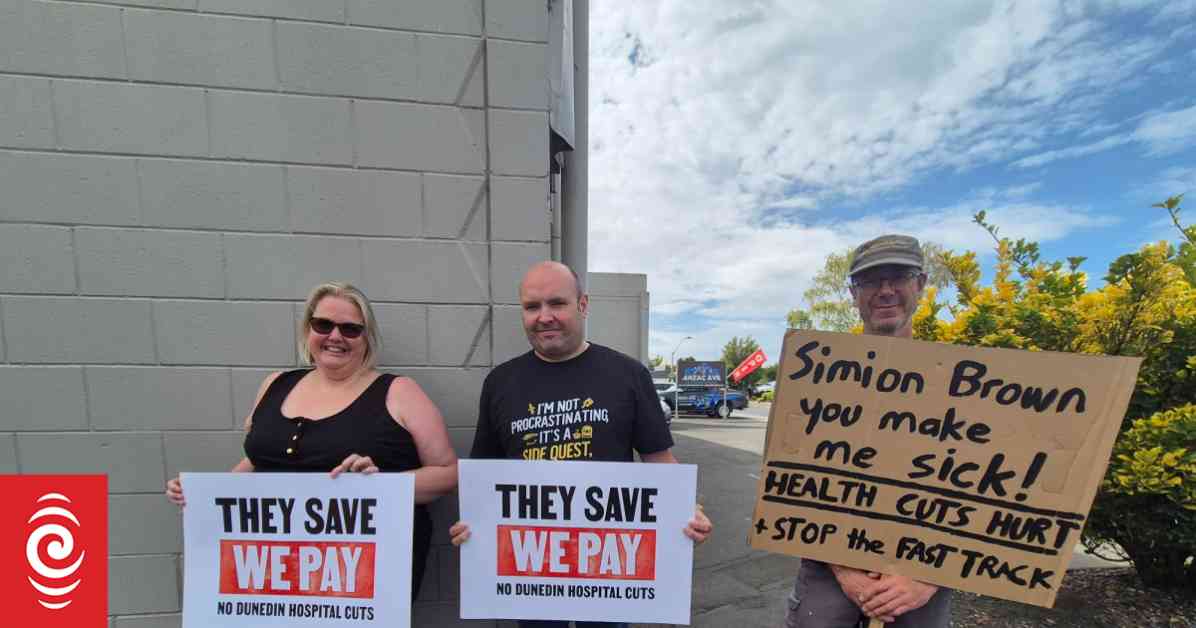The streets of Dunedin were abuzz with energy and tension on Friday as Health Minister Simeon Brown found himself at the center of a heated confrontation with vocal protesters. The uproar stemmed from Brown’s recent announcement regarding the new Dunedin Hospital, a project that has been a source of controversy and frustration among locals.
In his address, Brown revealed that the proposed $1.8 billion hospital would house 351 beds, a significant reduction from the initial plan. However, he assured the public that the facility would possess the capacity to expand to 404 beds in the future, providing much-needed flexibility. The minister emphasized that the revised plan aimed to bring certainty to the people of Dunedin while staying within the allocated budget.
The announcement, though intended to offer clarity and reassurance, only served to further ignite the already simmering discontent among the gathered protesters. Approximately 100 individuals congregated at the site, their voices rising in unison as they voiced their displeasure through chants and slogans. As Brown attempted to leave the scene, the crowd swarmed around his vehicle, their frustration palpable as they accused him of deception and chanted demands for a hospital built with public health in mind, not private interests.
The scene outside the hospital was one of chaos and confrontation, with emotions running high on both sides. Protesters, emboldened by their shared sense of outrage, stood their ground even as police attempted to disperse the crowd and maintain order. The clash of ideals and priorities was starkly evident, underscoring the deep-seated concerns and frustrations that have plagued the community in the wake of the hospital project’s tumultuous journey.
Challenges and Controversies Surrounding the New Hospital
The tumultuous history of the Dunedin Hospital project has been marked by a series of challenges and controversies, reflecting the complexity and sensitivity of healthcare infrastructure development. A government-commissioned report from the previous year shed light on the financial constraints and logistical hurdles that have plagued the endeavor, highlighting the stark reality that the initial budget projections were woefully inadequate. The projected costs of the hospital expansion ballooned to a staggering $3 billion, a figure that far exceeded the original estimates and prompted concerns about the project’s feasibility and sustainability.
Against this backdrop of escalating costs and shifting priorities, the local community has been left grappling with uncertainty and frustration, as the promise of a new and improved healthcare facility hangs in the balance. The discrepancy between the proposed bed count and the actual capacity of the hospital has become a point of contention, with residents and activists alike voicing their concerns about the adequacy of the current plans and the potential implications for the community’s well-being.
As the protests outside the hospital reflect, the stakes are high and the sentiments deeply entrenched, underscoring the need for transparent communication, thoughtful planning, and genuine engagement with the concerns of all stakeholders. The clash between government officials and impassioned citizens serves as a stark reminder of the challenges inherent in balancing competing interests and priorities, especially in the realm of public health and infrastructure development.
The road ahead for the Dunedin Hospital project remains fraught with uncertainties and complexities, as the community grapples with the implications of the recent developments and strives to find common ground amidst divergent viewpoints and conflicting agendas. The voices of protest and dissent, though loud and discordant, speak to a shared desire for accountability, transparency, and inclusivity in the decision-making process, underscoring the enduring importance of civic engagement and advocacy in shaping the future of healthcare delivery and accessibility.





